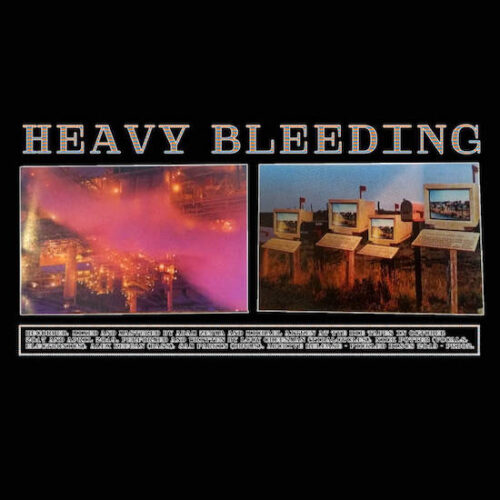Last week, I was driving through the countryside listening to Heavy Bleeding – Blood Sport’s collaboration with Lucy Cheesman’s live-coding project Heavy Lifting – when some nerve somewhere in my neck went haywire. Perhaps I shifted in my seat, made some sort of miniscule movement that sent my muscles into spasms, perhaps I didn’t. Either way, my back was painfully useless and my neck was stuck. The music’s irregular rhythms, clicking industrial patterns, and pulsing bass became, in my mind, errant electrical impulses ransacking my muscles, compelling them to move, to ripple uncontrollably under my skin. It seemed an appropriate image at the time, almost like a compliment.
This self-titled collaboration, it should also be said, constitutes Blood Sport’s final recordings. The Sheffield group – Nick Potter, Alex Keegan, and Sam Parkin – called it quits in late 2017. When they announced their dissolution, it seemed sudden. The band had been around for a while, sure – about seven years or so. But it wasn’t until sometime in 2015 that what they were doing – a wild blend of the political and personal, of experimental, industrial, post-punk, techno, and afrobeat influences they coined "aggrobeat" – really coalesced. For the next two years they were something special, probably one of the best bands in the world, and definitely one of my favourites. And then, at the top of their game, seemingly bursting with potential, they were done.
The releases that document this period are somewhat unconventional, but entirely essential. They are less reflective of the expectations of the music industry than they are of the core values of the band that made them. There are no proper LPs. What we have (in chronological order) is a four-track 12" packaged alongside a mix CD approximating one of the band’s Hybrid Vigour club nights, a live LP documenting a fiery set of unreleased material at Cafe Oto, and a two-track 12" on Helena Hauff’s Return To Disorder label. The growth exhibited by the band from release to release was almost outlandish. But more importantly, all the sounds they made were, if not entirely without precedent, very exciting.
Listening to Blood Sport was like learning an extraterrestrial language with some strangely recognisable words. When they broke up, I heard there was more material on the way: a double A-side that has yet to materialize and the collaboration under discussion. But after nearly two years, I assumed both projects had been shelved. Until last month, when Cheesman’s Pickled Discs released the Heavy Bleeding recordings as a pay-what-you-want digital release, alongside a sample pack Blood Sport put together for the live-coding program TidalCycles.
Briefly, the story goes like this: Back in 2016, Heavy Lifting and Blood Sport formed Heavy Bleeding for a performance at that year’s Algomech festival in Sheffield. Sets at Supersonic, No Bounds, and a residency at Algomech 2017 followed. In October of 2017, just before Blood Sport’s split, they all convened at Tye Die Tapes and made a record. And that was that. Heavy Bleeding‘s release was originally intended to coincide with the commencement of Algomech 2018, but the fest was postponed until this year. So, Heavy Bleeding’s sole LP was unearthed and mastered this spring, just in time for the festival’s third iteration.
Immediately, the through lines that run from both groups into Heavy Bleeding are apparent. The dexterous, shifting rhythms and expressionist vocals that were a Blood Sport trademark are very much present, as are the scotch-tape sample patterns and beats that run roughshod over Heavy Lifting’s best work.
The ways in which Heavy Bleeding deviate from their component groups is equally clear. There are no guitars. Keegan swaps his for bass, while Potter scraps his baritone to work exclusively with live electronics. Compared to Live At Cafe Oto or ‘Harsh Realm’ / ‘Boiled In Dust’, Potter’s vocals, when present, are relatively unprocessed, clear and forward in the mix, easily discernable, toying with an odd sort of melody. Cheesman’s programming slips seamlessly into the group dynamic, as she and Potter supplement Parkin’s frenetic drumming with percussive sound effects and painterly washes of noise.
Everyone plays around Keegan’s basslines, which stabilise the compositions – especially the instrumentals – preventing them from tipping over into chaos, though the feeling that they just might is ever present. The overall effect is like that of an intricate clockwork or maybe an anomalous, complex organism. There’s a keen logic to it, and it’s built of parts you may have seen somewhere before, but it takes a minute to suss it all out. It requires a degree of translation. It sounds very exciting.
As I write this, I’m laid up on the couch while Heavy Bleeding plays on my stereo and up and down my malfunctioning spine, across my nerve endings. I think about my body as both a known and unknowable quantity, as a vehicle of both great potential and an unpredictable capacity for malfunction. I think about how this record functions as both a distinct, fleshed-out body of work and as a vessel of captured but unrealisable possibility. How, in this way, it’s similar to the rest of Blood Sport’s later work in that it doesn’t foreshadow an ending – or feel anything like a group’s final recording – though I suppose, outside of fiction, artworks rarely do. I think about component parts and influences, and how marvellous it is that Heavy Lifting and Blood Sport were able to come together, however briefly, to create something as deeply familiar and extraordinarily alien as our own bodies.



